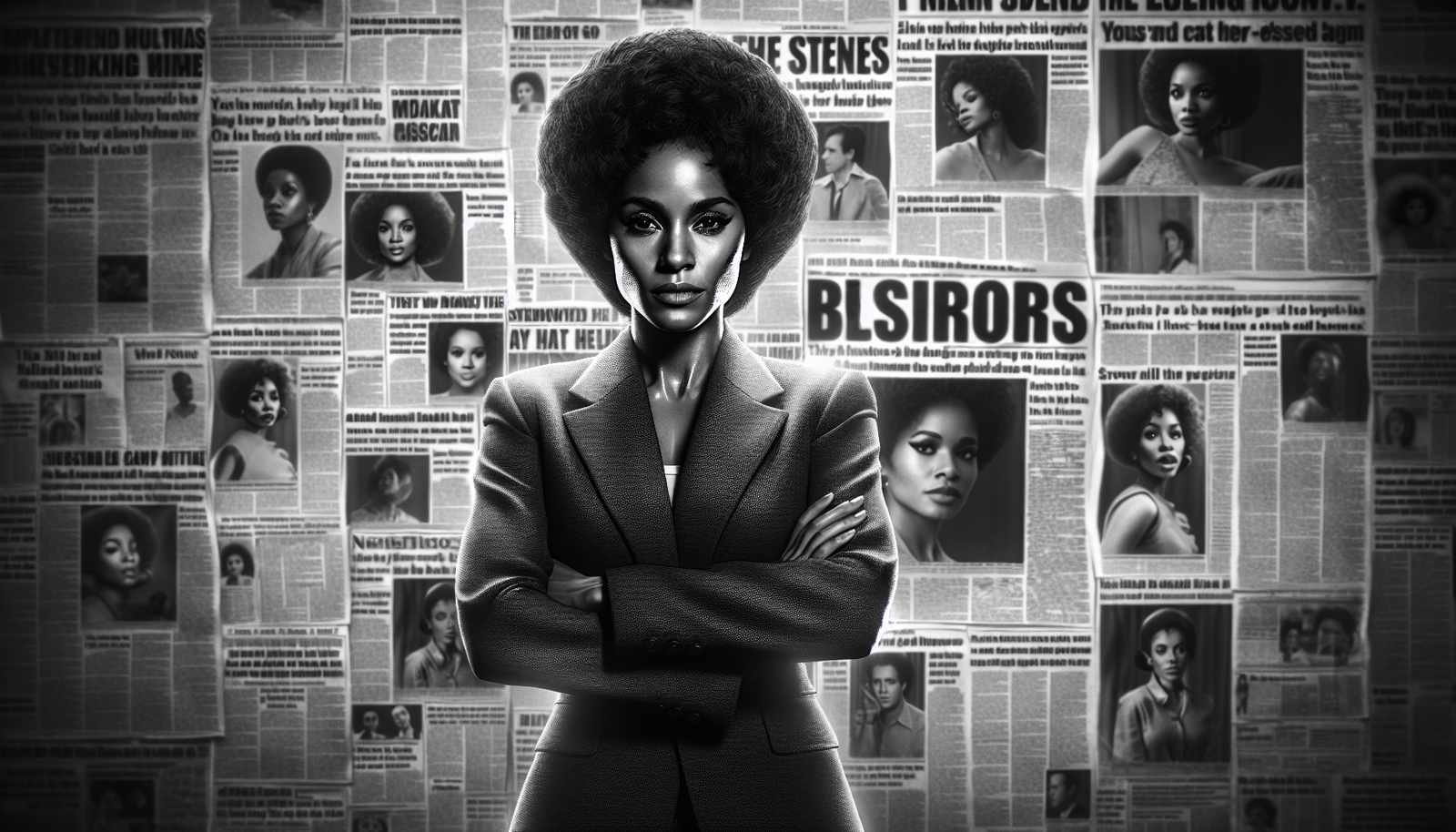Teyana Taylor shuts down media’s misleading divorce coverage

In a world where sensationalist media headlines reign, it’s refreshing to see celebrities taking a stand against misleading coverage. Teyana Taylor, the multi-talented artist, is the latest to shut down the rumors surrounding her divorce. Instead of fueling the clickbait culture, she clapped back at the media for misrepresenting her personal life. Joining the conversation, Tika Sumpter and Snoop Dogg shed light on their new sports comedy film, “The Underdoggs.” Switching gears, the spotlight shifts to Michael B. Jordan, as his wrecked Ferrari is now up for auction after his accident in Los Angeles. And lastly, we have Nicki Minaj responding to Megan Thee Stallion’s diss in her song “Hiss,” taking the opportunity to make personal attacks. Stay tuned as we explore these intriguing stories that navigate the realms of resilience, comedy, fame, and personal battles.
Background on Teyana Taylor’s Divorce
Teyana Taylor, a talented singer, actress, and dancer, recently went through the difficult experience of getting a divorce. However, what should have been a private matter was sensationalized and misrepresented by the media, resulting in misleading headlines that caught the attention of the public. Unfortunately, this is a common trend in today’s media landscape, where clickbait headlines take precedence over accurate reporting.
Media’s Role in Misleading Divorce Coverage
The media has a penchant for prioritizing clickbait headlines over factual and responsible journalism. In the case of Teyana Taylor’s divorce, this was clearly evident. Instead of focusing on the details and complexities of her situation, the media chose to craft sensationalized headlines that exaggerated and misinterpreted the facts. This not only undermines the integrity of journalism but also has profound consequences for the personal lives of celebrities.
Misleading divorce coverage can have a lasting impact on celebrities’ mental health and overall well-being. The constant scrutiny and misrepresentation of their personal lives can take a toll on their emotional state. It is essential for the media to understand that celebrities are human beings who deserve respect and privacy.
In the age of social media, where information travels at the speed of light, it is crucial for the media to exercise responsible journalism. The dissemination of misleading information can have far-reaching consequences, not only for the individuals involved but also for the general public. The media plays a significant role in shaping public perception, and inaccurate reporting can lead to misinformed opinions and unjust judgments.
Teyana Taylor’s Reaction to Misleading Coverage
Teyana Taylor, known for her fierce personality and unapologetic authenticity, did not stay silent in the face of misleading coverage. She took to social media to address and correct the false information that was being spread. By utilizing her platform, she had the power to provide her side of the story and set the record straight.
Taylor’s response to misleading coverage demonstrated the importance of celebrities speaking out against media misrepresentation. By refusing to be a passive participant, she actively challenged the false narratives being perpetuated. Her bold stance not only empowered herself but also inspired others to question and challenge the veracity of the information presented by the media.
Effects of Misleading Coverage on Public Perception
Misleading divorce coverage, propagated by the media, can significantly shape public opinion. When individuals solely rely on sensationalized headlines and inaccurate reporting to form their judgments, the result is an unfair and incomplete understanding of the situation. This can lead to individuals making biased assumptions and decisions based on false information.
Forming judgments based on inaccurate information is not only unjust but also harmful. It perpetuates a culture of misinformation and can have severe consequences for the individuals involved. It is the responsibility of the media to provide accurate and objective reporting to ensure that the public is well-informed and capable of making fair judgments.
Teyana Taylor’s Fight Against Misrepresentation
Teyana Taylor has taken it upon herself to reclaim her narrative and challenge media misrepresentation by asserting control over how her story is told. By actively engaging with her audience, whether through interviews or social media, she has the power to present herself authentically and counter the misleading coverage that has been spread.
The power of authenticity cannot be underestimated. By being open and transparent about her experiences, Taylor not only combats the misrepresentation but also inspires others to do the same. Her refusal to conform to the narrative shaped by the media serves as a beacon of hope for those who may be struggling with similar issues.
Taylor’s actions also serve as a reminder for individuals to question the information presented by the media and think critically. By encouraging others to challenge false narratives, she empowers individuals to take control of their own stories and challenge the status quo.
The Clickbait Culture in Media
Clickbait headlines have become the norm in today’s media landscape. Publications prioritize catchy and attention-grabbing titles over accurate and nuanced reporting. The goal is often to generate more clicks and drive traffic to their websites, rather than providing truthful and substantive content.
The motives behind the creation of misleading headlines are clear – to generate revenue and increase readership. However, this approach comes at a cost. Clickbait journalism erodes public trust in the media and perpetuates a culture of sensationalism and superficiality. It undermines the very essence of journalism and diminishes its impact as a tool for informing and empowering society.
The Impact of Misleading Coverage on Celebrities
For celebrities like Teyana Taylor, media misrepresentation has a significant impact on their mental health and overall well-being. They face constant scrutiny and invasion of privacy, as their personal lives are dissected and misrepresented by the media. This intense scrutiny can lead to anxiety, depression, and other mental health issues.
The toll of constantly being in the public eye is immense. Celebrities often find it challenging to have a moment of privacy or enjoy a normal life outside of their professional careers. Social media exacerbates this issue, as personal boundaries become blurred, and anonymous individuals feel entitled to pass judgment and offer unsolicited opinions.
Public figures deserve the same respect for privacy and personal well-being as anyone else. The media must recognize the need for boundaries and ethical reporting when it comes to celebrities’ personal lives.
Addressing the Pitfalls of Celebrity Gossip
It is crucial to distinguish between factual reporting and celebrity gossip. While entertainment news is a legitimate genre, it is imperative that media outlets prioritize accuracy and ethical reporting. Rather than focusing on sensationalism, responsible reporting should provide a balanced and objective view of celebrities’ lives.
Promoting responsible and ethical reporting in entertainment news starts with media outlets themselves. Encouraging journalists and editors to prioritize accuracy over sensationalism is essential in shaping the public’s perception and understanding of celebrities. By providing well-researched and substantiated information, media outlets can foster an informed, empathetic, and respectful society.
Celebrity Responses to Misleading Coverage
Teyana Taylor is not alone in her fight against media misrepresentation. Several other celebrities have spoken out against the misleading coverage they have faced throughout their careers. From actors to musicians, these individuals have used their platforms to voice their dissatisfaction and demand more responsible reporting.
Solidarity and support within the industry are crucial in combating media misrepresentation effectively. By standing together against inaccurate reporting, celebrities can send a powerful message and mobilize for change. Collective action can challenge the status quo and push for more accurate, ethical, and respectful journalism.
Conclusion
The battle against media misrepresentation is ongoing, and it requires the efforts of individuals and celebrities alike. Teyana Taylor’s experience with misleading divorce coverage serves as a reminder of how important it is to demand accurate and ethical journalism.
Individuals have the power to make a difference by questioning the information they consume and supporting responsible media outlets. Celebrities play a crucial role in this process by using their platforms to challenge false narratives and demand fair treatment.
By empowering individuals and celebrities to combat misleading coverage and advocating for responsible reporting, we can strive for a media landscape that values accuracy, ethics, and authenticity. Together, we can reshape public perception and create a culture that respects the dignity and privacy of all individuals, celebrities included.










